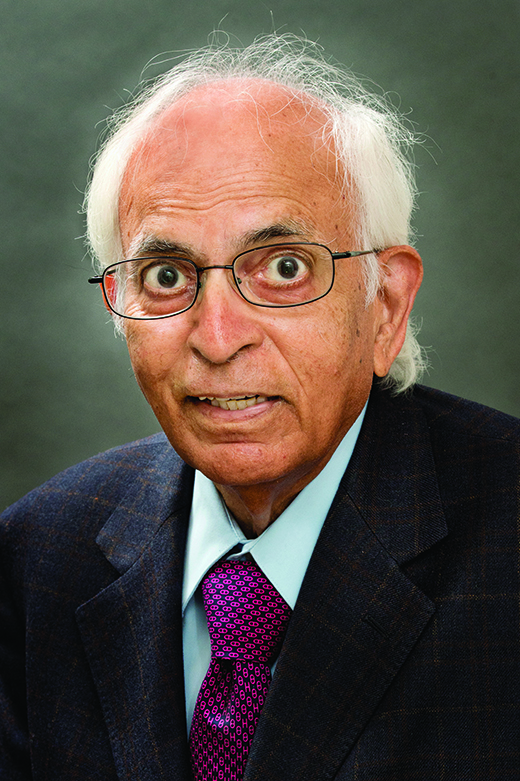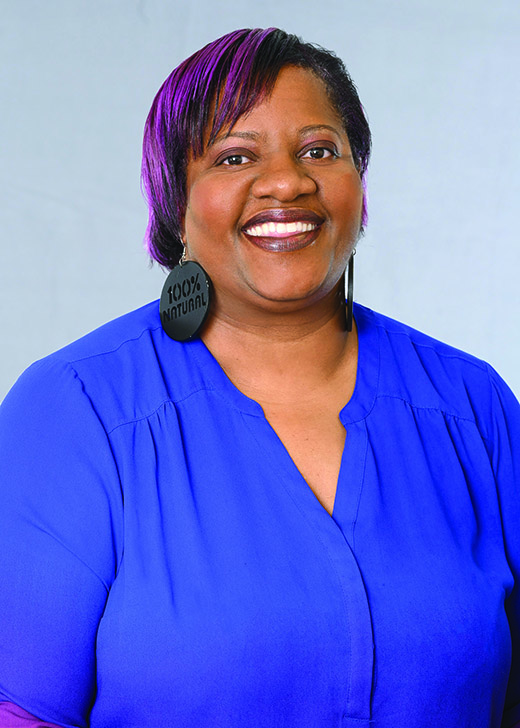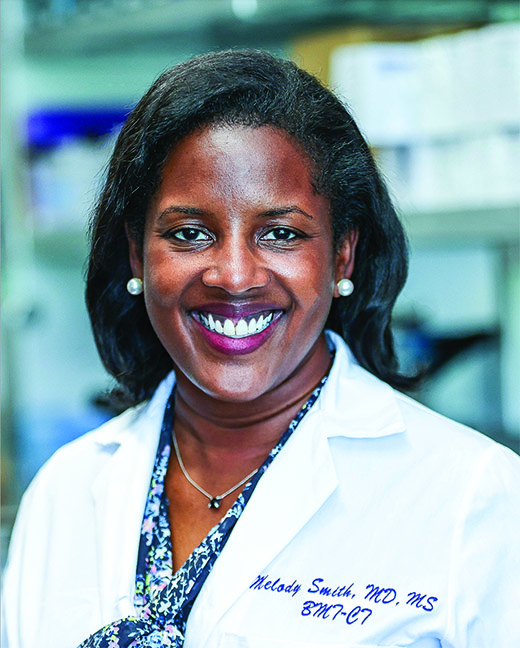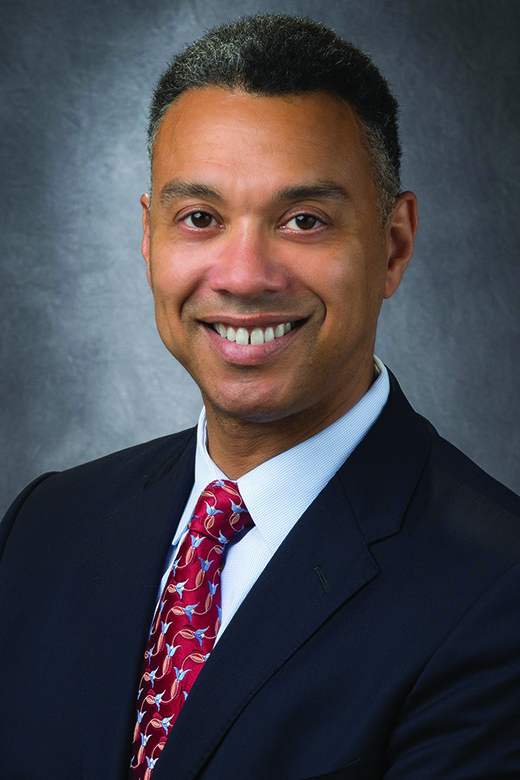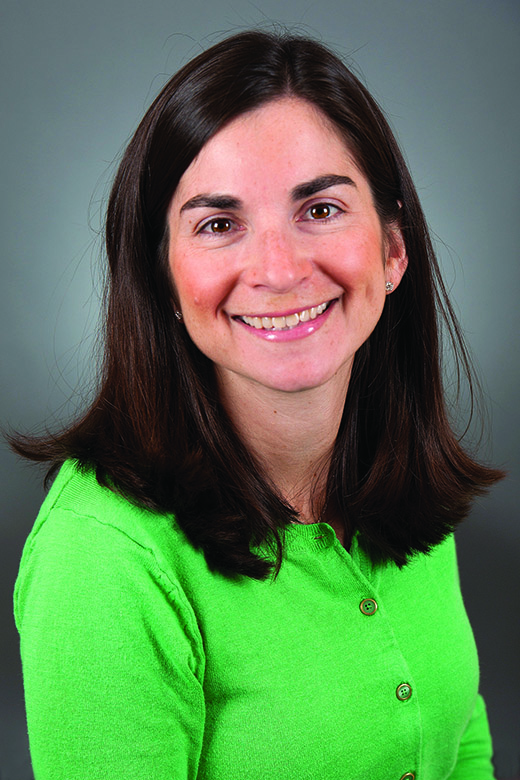Twenty years ago, the American Society of Hematology launched its Minority Recruitment Initiative (MRI), a multifaceted effort to attract more medical students from traditionally underrepresented backgrounds to hematology and increase the number academic and research appointments offered to hematologists from such backgrounds. Among the key components of this multifaceted initiative has been the MRI mentorship program, which matches participating medical students with career-development mentors. The Hematologist reached out to several of these mentor–mentee pairs to learn more about their experiences. (Note: Responses have been edited for clarity and space).
“We Should Have Confidence in Ourselves”
MENTEE: Jacqueline Barrientos, MD, Chief of Hematologic Malignancies and Director of Oncology Research, Mount Sinai Comprehensive Cancer Center, Miami Beach, FL; Adjunct Professor of Medicine, Donald and Barbara Zucker School of Medicine at Hofstra/Northwell, Manhasset, NY
MENTOR: Kanti Rai, MD, Joel Finkelstein Cancer Foundation, Professor of Medicine and Molecular Medicine, Donald and Barbara Zucker School of Medicine at Hofstra/Northwell and the Feinstein Institutes for Medical Research, Manhasset, NY
OVERVIEW: Dr. Barrientos first corresponded with Dr. Rai via email in late 2009 after an introduction by another of her mentors. The formal mentorship began the following year, when Dr. Barrientos joined Dr. Rai at the Chronic Lymphocytic Leukemia (CLL) Research and Treatment Program at what is now Northwell Health (formerly Long Island Jewish Medical Center) in New Hyde Park, New York. Although Dr. Barrientos left the practice to join Mount Sinai Medical Center in 2022, Dr. Rai emphasized that the two remain connected and that their relationship has deepened over the years: “We are a family: father-daughter!” Dr. Barrientos added, “I talk to Dr. Rai every other day; I don’t let him out of my sight.”
The Mentee’s Perspective
Why did you decide to seek out a mentor?
Dr. Barrientos: I have had multiple mentors over the years who have helped me find my niche. Especially when starting out, it is important to seek mentorship to learn from the experiences of other doctors and learn how they got to where they are. In a way, I was blessed to have a mentor who once served as ASH’s president and who later became a Wallace H. Coulter Award recipient, a recognition for his demonstrated lasting commitment to the field of hematology — my passion.
What did you most want to discuss with your mentor?
Dr. Barrientos: I just wanted to learn how we came to where we were in the field [with chemotherapy treatments], because my goal was to improve it. I understood that chemotherapy, although effective, had a lot of terrible side effects, and I wanted to work toward achieving better outcomes while improving the overall well-being of the patients. I felt strongly that there had to be a better way. I knew that targeted agents for other conditions like chronic myeloid leukemia were revolutionary, so we just needed to find the magic bullet that could achieve the same in CLL. My goal was to bring some of the most promising novel agents in development to our center to be able to offer them to our patients when all other prior lines of therapy had failed, but I needed someone more senior to help me understand and maneuver around the pitfalls of clinical research.
What impact did being a mentee have on you and your career?
Dr. Barrientos: With the support of Dr. Rai, I felt the sky was the limit. There was nothing I could not achieve if I worked hard towards it. There have been other amazing mentors in my career who have helped and supported me through my journey, including John Leonard, MD, and Rick Furman, MD, from the lymphoma program at Weill Cornell Medicine. To this day, even as a seasoned attending, I still run cases by them. We truly never stop learning.
What is the biggest tip you have for someone who is seeking out a mentor?
Dr. Barrientos: Seek out someone who will have the time to sit down with you and guide you in your career path, as each path is unique. Find a mentor who understands you and can help you achieve your goals. There was a moment in my life when I questioned whether I had what it took to get where I am now. Had it not been for truly supportive mentors, I would not be here. It is important to listen to well-intended advice, but at the end of the day, follow the dream that will make you the happiest. We only live once, and time goes by really fast. A successful relationship comes from understanding your mentor as well. The relationship goes both ways.
Do you believe mentor–mentee relationships are especially significant for minority communities?
Dr. Barrientos: Absolutely. I think it may be easy to get lost without a mentor who could help introduce you to people who may seem intimidating at first. Getting into a room full of people who don’t look like you and don’t share your experiences can be overwhelming and lead to imposter syndrome. A mentor can help remind you that you are not there by chance, that you do deserve the opportunity to be there.
Would you like to add anything else?
Dr. Barrientos: I think the support that ASH has provided me over the years is invaluable and cannot be measured. I can only hope to become the best mentor I can be for future generations of hematologists. And now, seeing my niece in medical school doing research in hematology and getting an ASH grant fills my heart with pride and joy. Hematology is super interesting and rapidly evolving; thus, we need fresh ‘blood’ in the field.
The Mentor’s Perspective
Why did you decide to become a mentor?
Dr. Rai: I have enjoyed being a teacher, and I have found that being a mentor is both a challenge and highly fulfilling when you are lucky enough to find a mentee who is not only bright but has true aspirations to get better. Decades ago, when I was looking for guidance and advice, my own mentors helped. Thus, I believe that I owe it to my own mentors to make myself available as a mentor. Whatever I have contributed to hematology, I owe it to my mentors: former ASH President Eugene Cronkite, MD, and Arthur Sawitsky, who was a great teacher.
What did you most want to share with your mentee?
Dr. Rai: That we should have confidence in ourselves; if we do not have that important ingredient for success, then I work with my mentee and slowly, systematically — and no matter how much time it takes, we devote that time — to develop that self-confidence. Much attention is being paid to colleagues from underserved populations as to why some of them lack self-confidence. Coming from India, I have noticed that one of the reasons why I am spontaneously in tune with the psyche of our minority population is the little fact of India’s colonial past. If I can succeed and be recognized among some of the leaders in hematology, then my mentee, Dr. Barrientos, coming from Lima, Peru, has reason to aim for a similar target — if not even higher.”
What impact did being a mentor have on you?
Dr. Rai: My relationship with Dr. Barrientos has had a lasting impact on me personally! And why wouldn’t it? In our case, the mentor and mentee truly worked side by side, literally rubbing shoulders. We talked patients, politics, family. One time, I thought I might be having a stroke. Instead of calling 911, I called Jacquie! She came to my house right away. She took me to the hospital. Fortunately, it was a minor stroke, and she drove me back home after I had been discharged. We are a family: father-daughter! My daughter Samantha, herself a physician, and Jacquie call each other regularly. My wife, Susan, trusts Jacquie. I was the first person with whom Jacquie shared a photo of her daughter Mariana’s graduation from Yale and of her younger daughter Violeta visiting Peru!
“Everyone Has Something to Work On”
MENTEE: Deirdra Terrell, PhD, Associate Professor, Department of Biostatistics and Epidemiology, University of Oklahoma Health Sciences Center, Oklahoma City, OK
MENTOR: James George, MD, George Lynn Cross Professor of Medicine, Department of Biostatistics and Epidemiology, University of Oklahoma Health Sciences Center, Oklahoma City, OK
OVERVIEW: After their introduction by a shared colleague in 2001, Dr. George invited Dr. Terrell to interview for an open clinical trials coordinator position with the Oklahoma Thrombotic Thrombocytopenic Purpura (TTP) Registry at the Oklahoma Health Sciences Center. Dr. Terrell, who at the time was looking for a job “where I could feel like I was impacting actual patients” accepted the offer and wound up playing a key role in broadening the understanding of racial disparities among patients with TTP. Their mentorship relationship continues to this day, but it has evolved. Dr. George stopped seeing patients five years ago, the clinical responsibilities of the TTP Registry were assumed by clinical colleagues, and Dr. Terrell became the principal investigator for the registry. “However, Dee’s office is next to mine, as it has been for 22 years, so we still talk together very often,” Dr. George said. “The relationship has evolved from Dee working for me to me working for Dee.”
The Mentee’s Perspective
Why did you decide to seek out a mentor?
Dr. Terrell: Actually, I didn’t intentionally seek out a mentor. I wanted a new job where I could feel like I was impacting actual patients. In my previous position, I didn’t have any contact with patients, so I asked Dr. (Sara) Vesely if she knew of any jobs that were open that could fill that void for me. She suggested that I reach out to Dr. George about a clinical trials coordinator position he had open. I fully expected my career to just stay there; I had a master’s degree and I loved working with patients. It was the highlight of my day when I was able to see patients get better from the experimental treatments we were giving them. Almost as soon as I started, Dr. George began to ask me if I had any interest in going into medical school or getting my PhD. I explained to him that I was a first-generation college student, so the fact that I had a master’s degree was more than enough for me and that I was tired of working full-time and going to school full-time. But he wouldn’t let it go and kept asking me about it. Eventually he said that he would even help support it with an education stipend. The offer was too good to pass up, and accepting it was probably one of the best decisions I have made! Dr. George just has been there through every stage of my career, helping and pushing me to reach new heights.
What did you most want to discuss with your mentor?
Dr. Terrell: Although at first I didn’t think I needed a mentor, as our relationship grew, I asked his advice on everything. We argued for at least two weeks over what my dissertation topic should be. Eventually, I won! He looks over all my publications prior to submitting them, he helps me with grant applications, and he gives me advice on whom to trust as collaborators. He has also helped me know when to say “yes” to certain opportunities (and when to say “no”). At the beginning, he would let me follow him around during the ASH annual meeting and introduce me to all his colleagues because I didn’t know anyone and the meeting was super overwhelming.
Did anything surprise you about the mentor–mentee relationship?
Dr. Terrell: I think it has to be natural. You have to trust each other. I knew that, when Dr. George suggested I do something, it was him looking out for me. He never tried to manipulate me into doing something. With other chairs or supervisors I’ve had, I would never know if they really wanted me to succeed. I have never wondered that about him, and because of that, I trust his judgment and advice.
What is the biggest tip you have for someone who is seeking out a mentor?
Dr. Terrell: Look for someone you feel like your personality can work with. By that I mean someone who can give you hard feedback but does so in a way that you can use to make you get better. As a mentee, be prepared to receive the tough feedback. Don’t be defensive. Everyone has something to work on, and no one can figure out this thing called academia on their own.
Do you believe mentor–mentee relationships are especially significant for minority communities?
Dr. Terrell: I think mentorship is important for everyone regardless of background, but for people who are first-generation college students or from backgrounds where they haven’t been exposed to as much in the world or in academia, it is especially valuable. I gave my first international talk because they invited Dr. George, and he suggested they ask me instead. It’s that kind of stuff that pushes you to be the best version of yourself. Dr. George would go out to eat dinner with big names in the classical hematology world — people whose papers I had read and was generally a huge fan of — and he would tell them that he is bringing his colleague (me!) with them to dinner. As I think back on it, I learned a lot on both sides: as a mentee and how to be a mentor. I have an open door, here’s-my-cell-phone policy just like Dr. George. When I go to meetings, I ask my students if they want to come with me to sessions, to dinner, etc., so they don’t feel alone. Recognizing that everyone hasn’t had the same experiences is important, but doing it in a way that never makes them feel less than is the most important.
The Mentor’s Perspective
How did you originally connect?
Dr. George: The original contact was from our common colleague, Sara Vesely, PhD. Sara and I were recruiting for assistance with our Oklahoma TTP Registry. Sara knew Dee from her MPH classes. I invited Dee for an interview and, after a short conversation, offered her the position. Dee said she’d prefer a position where she could become involved with diversity, equity, and inclusion — 20 years before this became established and common. I told her that her focus would be on patients with TTP, and TTP had no racial disparity. She accepted anyway. One year later, we discovered that there was a striking racial disparity among patients with TTP. This observation was possible because we could accurately identify patients with TTP because of their severe ADAMTS13 deficiency. We were able to measure ADAMTS13 activity in 2001 because of our collaboration with Prof. Bernhard Lammle, who had discovered the role of ADAMTS13, then known as von Willebrand factor-cleaving protease. The frequency among the Black population was approximately five-fold greater than that among the overall Oklahoma population. This was the research Dee had been looking for.
What did you most want to share with your mentee?
Dr. George: I simply wanted to share what I’d learned throughout my career. Topics and advice changed from day to day. Everything is crucial, or maybe nothing is. It’s simply a matter of what we’re going to do today.
What impact did being a mentor have on your career?
Dr. George: My mentees made my career successful. Without them, my success would have been much different. I’m sure that I’ve learned more from my mentees than they have learned from me.
What is the biggest tip you have for someone who wants to serve as a mentor?
Dr. George: A mentor needs to care for the success of his mentee more than he cares for his own success. If you do that as a mentor yourself, then you will certainly be successful.
“It’s Helped Me to Circumvent Some Pitfalls”
MENTEE: Melody Smith, MD, Assistant Professor of Medicine, Division of Blood and Marrow Transplantation and Cellular Therapy, Department of Medicine, Stanford University, Stanford, CA
MENTOR: Christopher Flowers, Professor and Division Head, Department of Cancer Medicine at the MD Anderson Cancer Center, Houston, TX
OVERVIEW: Dr. Smith applied for the ASH Minority Medical Student Award Program (MMSAP) as a first-year medical student and was paired with Dr. Flowers in the summer of 2004. She conducted research at Emory University’s Winship Cancer Institute under Dr. Flowers’ mentorship, and she worked with him again the following summer. They have maintained the mentorship relationship throughout Dr. Smith’s medical school years, residency, fellowship, and even today as her career in academic medicine continues to blossom. Today, Dr. Smith herself is a mentor to an MMSAP student.
The Mentee’s Perspective
What have you gotten out of having a mentor?
Are there any moments that particularly stand out in the mentor relationship, moments that you think encapsulate what having a mentor is all about?
Dr. Smith: Two moments come to mind. The first one epitomizes his generosity and willingness to share his wisdom and insight. As a second-year resident, I was preparing to apply for Heme-Onc fellowship. So, I made my list for the various programs, and I scheduled a meeting with Chris to review the list and get his input. Were these good places? Were these places that were going to help me develop as a physician scientist? What were his thoughts? He consistently been so generous with his time to help me to make these types of decisions. Another moment that stands out to me highlights his encouragement over the years. I remember very distinctly a period where I was wondering whether I was cut out for a career as a physician scientist as a postdoctoral researcher. I met with him at ASH, and I shared some of my doubts with him wondering whether this was the best course for me. Chris is such an objective and empathetic person. He was very patient in listening to me, understanding my concerns, and helping to guide me to know, “You're on the right track. You're doing what you need to be doing. Continue to do that.” His mentorship has truly helped me in countless ways.
What can a mentee do to make the relationship a success?
Dr. Smith: I would encourage mentees to be proactive in engaging with their mentors. That's what I tried to do when I needed his help or assistance. I would reach out, and he would make himself available. I think that the mentee should know that, once they have that mentorship relationship, it's important that they try to continue to stay engaged. Given that the mentor is likely quite busy, it’s easy for that mentorship relationship to break down if they aren’t doing that. So, I think mentees should be empowered to continue to engage their mentor and not be shy. Thinking “I'm a medical student” or “I don't know anything” — all of these things prevent people from developing that mentorship relationship or maximally benefiting from it.
Is there anything you’d like to add?
Dr. Smith: For those who may be aspiring hematologists or even committed to a career in hematology and further in their training — whether medical students or staff — the beautiful thing about the ASH MRI program is that it's never too late to get plugged in and find a mentor who can help you along the journey. That's something that really encourages me. Even if someone wasn't involved in ASH MMSAP, there are opportunities to be mentored and to really deepen their commitment to hematology through a mentorship.
The Mentor’s Perspective
What made you decide to become a mentor?
Dr. Flowers: I was really first involved as a junior faculty member at Emory — an assistant professor at that time — so exactly the same place where Melody is in her career right now. In 2003, at Emory University, I got involved through ASH, first with Cage Johnson and then with Cage Johnson and José Lopez, through what eventually became the Minority Recruitment Initiative. It didn’t have as formal of a name at that time. It was really a small program that was geared toward trying to help underrepresented minority medical students gain interest in hematology and pursue careers in hematology. During that year, I was a career development mentor for one of the students in the program and got to see, during the ASH annual meeting, the kind of research that those students were doing and learned about kind of the research interests that they had in the program, even with their applications. Even though the career mentorship component of that was super exciting and something that I’ve continued to do through today, I was actually a little bit jealous about the research mentor side of it and the opportunity to work one on one with a medical student. And so, I was super excited the following year when Melody applied and applied to work with our group, and then ultimately was accepted into the program. Some of the things that Melody described are some of the key hallmarks that we’ve seen in the success of the MRI program over the years. And that’s really that the medical students who come back for a second experience are those who are much, much more likely to pursue careers in hematology.
What advice would you give to someone who is thinking of serving as a mentor. How can that person be effective?
Dr. Flowers: Step in and engage. There are so many opportunities to mentor, particularly for those at various stages across their career in academic hematology. It could be more junior faculty members mentoring medical students or mentoring other trainees, or more senior faculty members mentoring other faculty members and mentoring later-stage trainees like hematology fellows toward careers. At my stage of career, a lot of what I do is I mentor senior faculty members and mentor even department chairs to help them find the next steps in their career pathway. Recognize that there are many mentorship roles that you can take on in across your career in hematology.
With mentorships, most people can easily see the benefit to a mentee. But does a mentoring relationship benefit the mentor?
Dr. Flowers: Absolutely is the short answer to that question. My role as a mentor has been the most fulfilling part of my academic career. In an academic career, there are personal successes that you can have in terms of your own research. But many of the most valuable achievements — at least the most valuable ones in my career —have been those in which I’ve been able to help a mentee to pursue their own research goals and have an even broader impact on the field of hematology.
Do you believe mentor–mentee relationships are especially significant for minority communities?
Dr. Flowers: If you can see someone who looks like you, who is pursuing exactly what you want to do, then that makes it possible. Until you can visualize that it’s possible, I think it’s an incredibly daunting challenge to know how you’re going to get from where you are early on in your career toward something like a career as an academic physician. That’s one of the things that the ASH community has been extraordinarily successful in doing, and I think that’s one of the reasons why the MRI program in hematology has been uniquely successful.
“Mentors Can Give You a Seat at the Table”
MENTEE: Michelle Long Schoettler, MD, Assistant Professor, Emory University School of Medicine, Blood and Marrow Transplant Program, Aflac Cancer & Blood Disorders Center, Atlanta, GA
MENTOR: Rachael Grace, MD, Director, Hematology Clinical Research, Boston Children’s Hospital; Associate Professor of Pediatrics, Harvard Medical School, Boston, MA
OVERVIEW: Dr. Schoettler met Dr. Grace in 2010, the summer between her first and second years at Wake Forest University School of Medicine in North Carolina. After learning about the ASH MMSAP, she began looking for a mentor, first locally and then broadening her search with an email to pediatric hematologists at Boston Children’s Hospital. Drs. Grace and Ellis Neufeld (now with St. Jude Children’s Research Hospital in Memphis, TN) took her on as a summer student. Dr. Grace actively mentored Dr. Schoettler up until 2019, when Dr. Schoettler moved from Boston to Atlanta. “Even though we don’t meet regularly anymore, I still consider her a mentor and role model, and I know I could reach out at any time.”
The Mentee’s Perspective
What was the frequency and structure of the contact between the two of you?
Dr. Schoettler: When Rachael and I were working on research projects together, we met weekly in person to review questions, data, and later manuscripts and grants. Throughout my training as a resident and fellow we touch based as needed.
How did the relationship evolve?
Dr. Schoettler: What began as a summer student project grew into multiple projects, awards, national presentations, and manuscripts and ultimately launched my career as a physician-scientist. Our relationship grew over time in many ways. During my summer research experience, in addition to becoming interested in hematology and clinical research, I fell in love with the city of Boston and all the outstanding faculty and trainees I worked with at Boston Children’s Hospital (BCH). Rachael helped me navigate elective rotations at BCH during my fourth year of medical school and connected me with residency leadership — efforts I’m certain helped me match at BCH for pediatric residency and stay on for my hematology/oncology fellowship. Rachael also helped me navigate the personal work-life balance challenges of being a physician-scientist, clinician, mother, and wife.
What is the biggest tip you have for someone who is seeking a mentor?
Dr. Schoettler: Mentors can give you a seat at the table, opportunities you may not have had otherwise. But then it’s up to you. Be a finisher, and complete tasks you commit to by the due date. Always communicate and be open to feedback and ways to improve.
Did anything surprise you about the mentor– mentee relationship?
Dr. Schoettler: I was surprised by the enormous amount of time and effort mentors put into shaping their mentees when they have so many other competing interests and tasks going on at all times. As a mentee, it’s important to recognize and respect this by always giving back equal or greater effort in return.
The Mentor’s Perspective
Why did you decide to become a mentor?
Dr. Grace: When I was in medical school, I was awarded a grant from the Society of Pediatric Research to support a research experience at a different institution than my own for the summer. In some ways, this was similar to the award that Dr. Schoettler received from ASH. I was so fortunate to join the research group of Dr. Ellis Neufeld, who has been a longstanding mentor to me for more than 20 years. This experience during medical school formalized my interest in pediatric hematology and truly shaped the rest of my career. The key role and benefits of outstanding mentorship in my own career shaped my interest in becoming a mentor.
What do you most want to share with your mentee?
Dr. Grace: The topics that we discussed varied during times of different phases of Dr. Schoettler’s career. When we started working together during her time in medical school, I wanted her to understand all the components of a career in academic medicine, pediatrics, and hematology/oncology. These conversations continued but, during residency, became focused also on conducting and supporting clinical research and, during fellowship, became focused on finding mentorship in a new research area and job negotiation. During these years, we discussed being a woman in academic medicine and efforts to achieve a work-life balance.
What impact did being a mentor have on you and your career?
Dr. Grace: I feel fortunate to have been a mentor early in my career. As I was trying to get my own clinical research career off the ground, I was inspired by Dr. Schoettler’s enthusiasm and benefited from her initiation and collaboration on multiple research projects. Her excitement about pediatric hematology and clinical research added to my own and made attending national meetings and working on projects together a joy. I feel lucky to have mentored Dr. Schoettler and am incredibly impressed by her academic accomplishments. Working with Dr. Schoettler was such a positive experience and privilege for me as a mentor early in my career, and this experience laid the foundation for me to continue as a mentor in my institution and within the ASH community as my career has developed. I’m so appreciative of ASH for giving me the opportunity to be a mentor early in my career.
What is the biggest tip you have for someone who wants to serve as a mentor?
Dr. Grace: Mentors should meet regularly with mentees to talk about their goals and to help prioritize and plan their work. Mentors also need to know their own style of work and have similar expectations for their mentee as they have for themselves. It is important to advocate for your mentee, speak highly of your fantastic mentees (including when they are not present), and nominate them for talks, committees, and leadership roles. Mentors need to be willing to sit on the sideline while giving their mentees the limelight. The success of the mentor is in the growth and accomplishments of the mentee.


